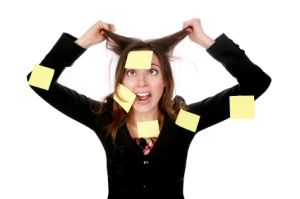 Human
life (especially in fast-paced North American society), in a word, is:
STRESSFUL! Whether you’re physically exerting yourself at work, dealing
with emotional family squabbles, prepping for that important “dream job”
interview or trying to arrange what you thought would be a ‘simple’
social gathering, even if you don’t “feel” stressed, that doesn’t necessarily mean your body (or psyche) isn’t taking a toll!
Human
life (especially in fast-paced North American society), in a word, is:
STRESSFUL! Whether you’re physically exerting yourself at work, dealing
with emotional family squabbles, prepping for that important “dream job”
interview or trying to arrange what you thought would be a ‘simple’
social gathering, even if you don’t “feel” stressed, that doesn’t necessarily mean your body (or psyche) isn’t taking a toll! Because we live in a society which promotes the notion of meritocracy (ie: the greatest rewards in life go to those who exert the highest and most consistent levels of effort), many of us feel we need to constantly be “on” or we’ll miss our chance at success. This coupled with our currently dismal economy and the phenomenon of “overcredentialization” has lead to a situation wherein many of us no longer recall how to relax and even go so far as to “invent” reasons to get stressed out. For example, while on so-called “vacations”, we often nitpick at the minutia failing to take pleasure in the simple details or worse contemplate all of the things we “should” be doing instead. The result? Yet MORE unnecessary stress. In other words, there’s a reason why sleep aids are among the top pharmaceutical sellers!
Evolutionarily-speaking, the “stress reaction” served to be productive. Allowing your heart to pound faster, muscles to tighten, blood pressure to rise, breath to quicken and senses to sharpen, it’s pretty easy to see how the aforementioned physiological changes would assist you if you were, let’s say, battling for territory against a Sabre-toothed tiger.
Wired in what experts call the “primitive” region of our brains, as Melinda Smith, Robert Segal, and Jeanne Segal explain in Understanding Stress: Symptoms, Signs, Causes, and Effects, the “stress reaction” was initially intended to be exclusively reserved for “life-threatening” (aka “fight-or-flight”) situations.
Now, it’s one thing to feel stressed if you’re quite literally facing uncertain death everyday as our cave-dwelling ancestors were, it’s a whole nother to “cry over spilled milk” or give yourself ulcers because traffic’s in a jam.
While we all have different levels of sensitization (influenced by both genetics and life events), prolonged exposure to stress can and often does “initiate a ‘biochemical onslaught’ [that] chip[s] away [not only] at our immune system[s], opening the way to cancer, infection and disease”, but further can lead to the development of neurosis such as depression or PTSD (Psychology Today).
Modern day stress is said to primarily originate from frustration, conflict, change or the perception of being “under pressure”. BUT it’s not ALL necessarily negative. Psychological examination on the subject has shown that a certain amount of “everyday” stress is actually a good thing: it serves to motivate, sharpen your memory, and improve focus, productivity and performance. Moreover, studies conducted by Dr. Firdaus Dhabhar, director of research for Stanford University’s Center on Stress and Health have indicated that “short-term” stress can improve your immune system: “trigger[ing] the production of protective chemicals and increas[ing] activity in immune cells that boost the body’s defenses.” The keys are obviously finding “balance” AND avoiding burnout! How do YOU personally cope?
Though yoga seems to be the latest fad as far as “stress management techniques” go, MAKING time to do something – anything – that allows you to refocus your energies inward and healthily “escape” the toils of the day is not just beneficial, but a NECESSITY for optimal psychological functioning! Delving into a good novel, cooking your favourite meal, jamming out tunes with a friend, going for a walk or putting pen to paper: all acceptable, all necessary AND all good for you. Here, the male population can further take a few hints from us of the fairer sex: there’s nothing like a good bath…or bitchfest!
Now, it’s important to realize that like stress, while essential and helpful in small dosages, too much emphasis on “escapism” is equally deleterious and may be a warning sign of maladaptive “addictive” habits forming (more on this next week).
I believe it goes without saying that the “work-life balance” is quite possibly one of, if not the MOST difficult ideal to achieve. On the one hand, work is necessary: it earns you an income (hopefully while providing you with some sense of fulfillment) so that you’re able to “invest” in other aspects of your life including: relationships and recreation. On the other hand, if you need to be chained to your desk 24/7 because you don’t bring in enough net, you miss out on many moments of great importance…not to mention your life will inevitably be consumed by stress.
As I said last week in our discussion of the “quarter life crisis”, while we cannot control all external events (though obtaining a strong educational background and learning to money manage will certainly help you in the career department! Go Fanshawe!), we CAN control our reactions to them, along with our overall psychological “thinking scheme”. In other words, don’t “stress” the small stuff…it may just be a matter of life or death (physiologically and/or psychologically speaking).

No comments:
Post a Comment